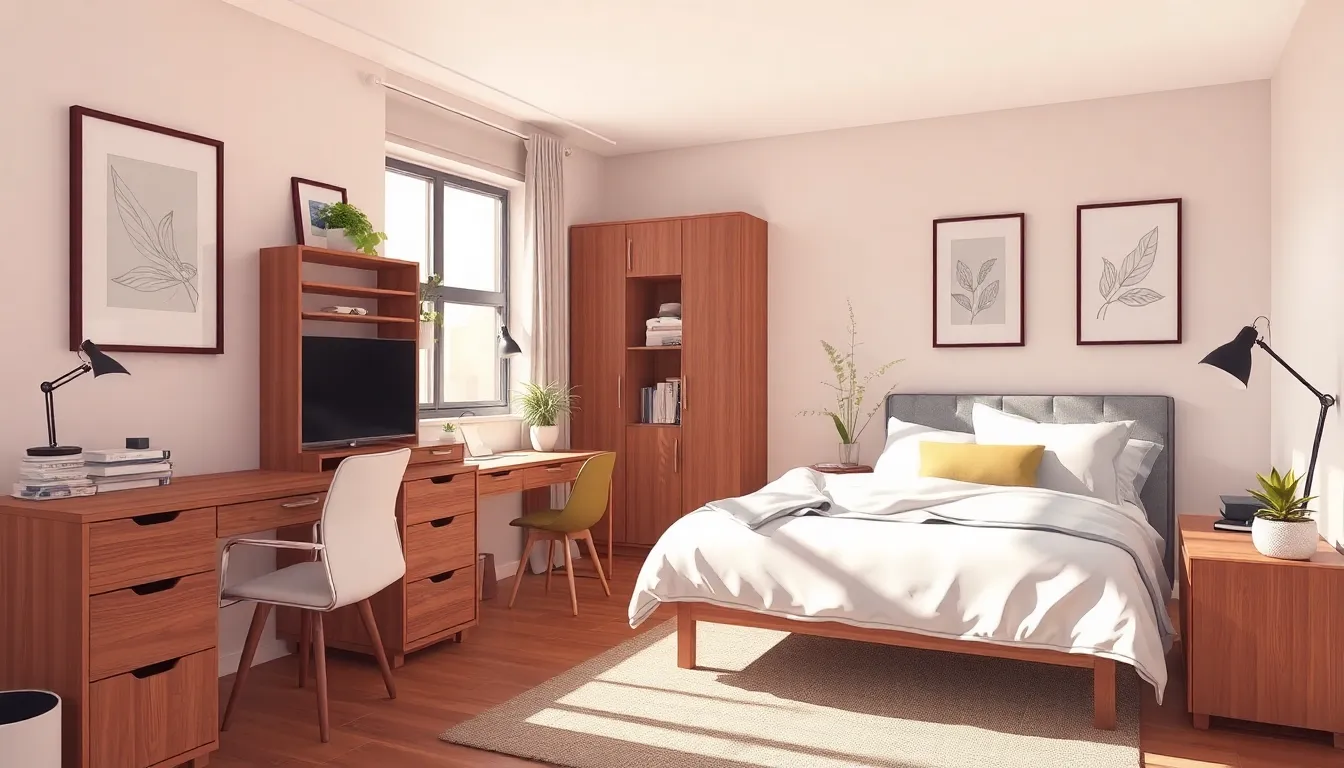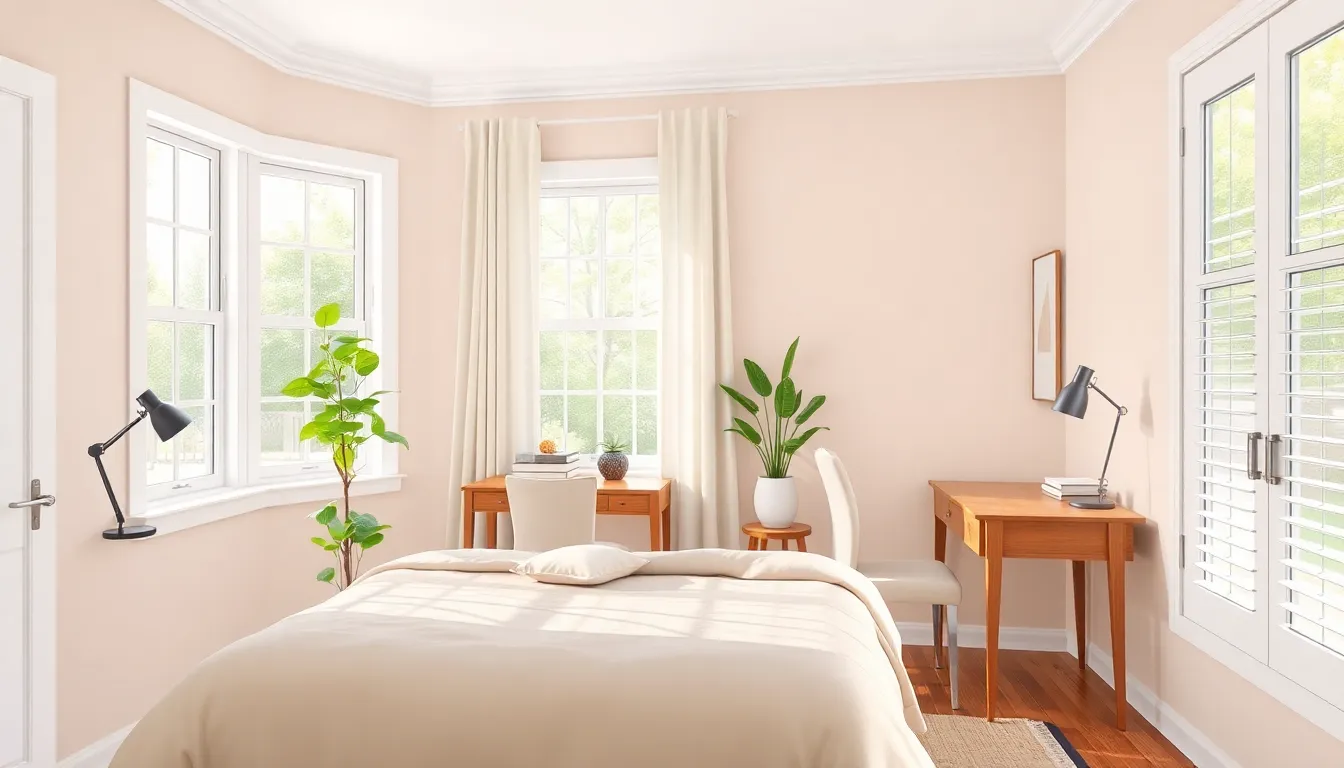Table of Contents
ToggleIn a world where rent prices soar higher than a kite on a windy day, renting out a room can be a game-changer. Imagine turning that spare room into a cash cow while making new friends—or at least new acquaintances who won’t steal your snacks. It’s like hosting a never-ending slumber party, but with the added bonus of extra income.
Benefits of Renting Out a Room
Renting out a room offers significant advantages in both financial and social aspects. Individuals can enjoy an increase in income while gaining new acquaintances through this arrangement.
Financial Advantages
Extra income becomes a reality when renting out a room. Many property owners cover mortgage payments or utility bills with the additional cash flow. The potential for earning fluctuates based on location and length of stay, but averages show a range of $500 to $2,000 monthly. Taking advantage of platforms like Airbnb can maximize earning opportunities for short-term rentals. Cost-sharing also becomes beneficial; tenants contribute towards expenses, alleviating financial burdens for homeowners.
Social Interaction
Social connections flourish when one rents out a room. Opportunities arise to interact with diverse individuals from various backgrounds, enriching the living experience. Engaging with guests often leads to lasting friendships and valuable cultural exchanges. Sharing spaces creates a sense of community, making the home feel vibrant and lively. Networking possibilities increase, which might lead to unforeseen opportunities professionally and personally.
Preparing Your Space


Preparing a room for rental requires attention to detail. Focus on creating an inviting environment that appeals to potential renters.
Essential Repairs and Maintenance
Conduct necessary repairs before listing the room. Check for issues like leaks, broken fixtures, and electrical problems. Addressing these concerns ensures safety and comfort, increasing the room’s attractiveness. Cleanliness matters as well; deep clean carpets and wash linens for a fresh feel. Consider updating paint or wallpaper for a more modern look, which significantly enhances visual appeal. Regular maintenance checks will help maintain the space throughout the rental period.
Furnishing the Room
Choose furniture that balances comfort and function. A comfortable bed, a sturdy desk, and ample storage options are crucial. Opt for neutral colors to create a versatile backdrop that suits various tastes. Add personal touches like artwork or plants, which can enhance the ambiance. Ensure all furnishings are in good condition and free from wear. Providing essential amenities such as bedding, towels, and kitchenware also increases renters’ satisfaction. Thoughtfully furnished spaces often lead to positive reviews and repeat bookings.
Setting the Right Price
Setting a competitive price for a rented room maximizes income and attracts renters. Researching the market helps identify appropriate pricing based on local demand and comparable listings.
Market Research
Analyzing rental prices in the area provides a clear understanding of what others charge. Observing platforms like Airbnb highlights current rates for similar rooms and amenities. Checking local classifieds and real estate websites gives additional insights into average rental prices. Gathering this data allows for better positioning in a competitive marketplace.
Pricing Strategies
Adopting effective pricing strategies optimizes income potential. Offering a competitive yet appealing rate attracts renters quickly. Seasonally adjusting rates based on demand can further enhance income. Providing discounts for longer stays encourages bookings. Highlighting unique features or amenities can justify higher pricing, leading to favorable financial returns.
Finding the Right Tenant
Finding a suitable tenant involves strategic advertising and thorough screening processes. These steps ensure a positive renting experience for both parties.
Advertising Your Room
Effective advertising significantly increases the chances of attracting the right tenant. Utilize online platforms like Craigslist, Facebook Marketplace, and Airbnb to reach a broad audience. Include high-quality photos showcasing the room and common areas to create interest. Write a clear, concise description highlighting key features such as size, amenities, and shared spaces. Offering an enticing rental price and specifying inclusions like utilities or Wi-Fi can enhance appeal. Engage in local community boards or forums to attract individuals searching for housing in the area. Be responsive to inquiries to maintain interest and encourage potential tenants to view the space.
Screening Potential Tenants
Screening potential tenants is crucial for selecting responsible individuals. Start with a comprehensive application process that includes rental history, employment verification, and references. Conduct background checks to assess credit reports and criminal history. Prioritize communication by scheduling interviews to gauge compatibility and assess tenant expectations. Establish clear rental agreement terms upfront, ensuring both parties understand responsibilities. Trusting instincts during the interview process often helps identify the best fit. Following these steps leads to a harmonious living arrangement and minimizes potential issues down the road.
Legal Considerations
Renting out a room involves various legal aspects that must be addressed. Understanding the implications helps ensure compliance and safeguards both landlords and tenants.
Lease Agreements
Clearly defined lease agreements lay the foundation for a successful rental arrangement. This document should outline terms, such as rental duration, payment amounts, and rules for shared spaces. Avoiding vague language minimizes misunderstandings. Both parties should sign the agreement to provide legal protection. Including provisions like subletting policies or penalties for late payments enhances clarity.
Local Regulations
Complying with local regulations is essential when renting out a room. Zoning laws often dictate the types of rentals permitted in specific areas. Researching permitted rental practices helps prevent legal issues. Additionally, some municipalities require specific permits or licenses for short-term rentals. Failing to adhere to these requirements may result in fines or eviction. Familiarizing oneself with tenant rights and local housing codes further ensures a smooth rental experience.








